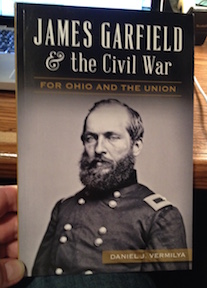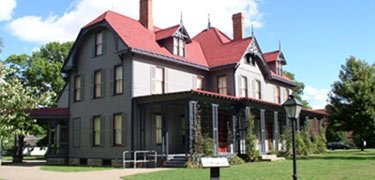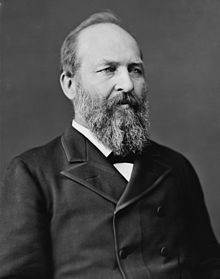James Garfield & The Civil War: An Interview with Author Dan Vermilya
 Here’s one I’ve been waiting for for a while: Dan Vermilya’s new book James Garfield & The Civil War (History Press, 2015). Of course, I’m eyeball-deep in other stuff at the moment and can’t dig into the book like I want to—but it’s been sitting on the edge of the desk, tugging at my attention from the corner of my eye. Like Garfield himself, the book sits on the periphery yet holds such promise.
Here’s one I’ve been waiting for for a while: Dan Vermilya’s new book James Garfield & The Civil War (History Press, 2015). Of course, I’m eyeball-deep in other stuff at the moment and can’t dig into the book like I want to—but it’s been sitting on the edge of the desk, tugging at my attention from the corner of my eye. Like Garfield himself, the book sits on the periphery yet holds such promise.
Since I can’t read the book at the moment, I did the next best thing: I called up Dan to talk to him it.
“Why Garfield?” I ask him.
“I like stories that don’t get a lot of attention, especially stories like Garfield’s,” Vermilya explains. “He’s one of the bearded presidents, lost in obscurity. People only know about him today because of his tragic assassination.”
Elected president in 1880, Garfield took office the following March. He actively served only four months; on July 2, Charles Guiteau shot Garfield in the back at a train station in D.C. “He lingered for months,” Vermilya says. It was a long, agonizing, infection-fevered death. Garfield finally succumbed on Sept. 19, 1881.
That’s the story people know about Garfield if they know anything. Several books recount it (which I’ve written about here). However, such accounts leave out “the historic chapter of his Civil War service,” Vermilya says. “It would be a disservice to focus only on his assassination. I want to tell people about this amazing part of his life story.”

Vermilya, who blogs at Our Country’s Fiery Ordeal and who works as a park ranger at Gettysburg National Military Park, grew up in northeast Ohio, about twenty minutes away from the James Garfield National Historical Site. “As long as I can remember, it’s a place we always used to drive by. So I’ve always been interested in the guy,” Vermilya says.
As a grad student, he volunteered to do several talks on the Civil War for the site. There, he grew to admire Garfield.
“There were a lot of similarities between Garfield and Lincoln,” Vermilya says: “both had a parent die at an early age, both were raised in log cabins, both worked as laborers when they were young. You really can say Garfield is a man who rose up through hard work and made something of himself.”
However, he didn’t know much about Garfield’s Civil War career until he started research for the book. “Most books that focus on the assassination gloss over his Civil War service,” Vermilya explains. “But like everyone at the time who served, that was a major part of his life. For the rest of his life, the title of ‘General Garfield’ stayed with him.”
When the war broke out, Garfield was in his late 20s, serving as a state senator in Ohio. “He was a young man,” Vermilya says. “On the day Ft. Sumter surrendered, Garfield said, ‘I would rather lose a million men in battle than see the South win.’ He’s passionate about the future of the nation.”
During the war, Garfield found himself “right in the middle of key events of the Civil War: Shiloh, the Fitz John Porter trial, Chickamauga,” Vermilya explains. “He’s one of the principal architects of the Tullahoma campaign.”
There was also an ongoing controversy with William Rosecrans that boiled up from the fields of Chickamauga. “After Chickamauga, did he or did he not go behind Rosecrans’ back to get Rosecrans fired?” Vermilya summarizes. “Garfield’s frustrated, certainly, because he holds different views than Rosecrans regarding how the war should be fought, but he doesn’t actively work against Rosecrans.” But charges of Machiavellian behavior have dogged Garfield’s legacy ever since.

Much of that legacy is difficult to sort through. “When he campaigned for president, his war record was made larger than life,” Vermilya says. Strong political forces swept into play. Garfield’s martyrdom has also influenced memory.
“He was a guy with a lot of contradictions—a very complex man,” Vermilya says. “His life was controlled by passions.”
These are the reasons I’ve found Garfield to be so fascinating myself. “Garfield remains the mystery man,” said historian James Perry in his book Touched with Fire: Five Civil War Presidents and the Battles that Made Them—the book that first piqued my interest in Garfield. (Dave Powell recently wrote about his Garfield fascination, too.) Perry said of those Civil War-made presidents, “[Garfield] was probably the smartest of the lot; he was also the most devious.”
But Vermilya doesn’t buy into the Machiavellian image Garfield’s been saddled with. “I’m glad you used that word, ‘Machiavellian,’” he tells me. “I don’t believe that. He was complex, but he wasn’t conniving.”
I don’t keep Vermilya on the phone for long: he has a Garfield symposium he’s speaking at in Mentor, Ohio. I thank him for his time, his insights, and his preview.
Garfield, from the cover of the book, waits for me and watches.
I am in the middle of completing Volume III of my trilogy on Chickamauga, which has an entire chapter devoted to the inter-workings of three men: Rosecrans, Dana, and Garfield. Exploring the complexities of that relationship, especially as it played out over time, took some doing. So naturally, I was delighted to see Dan’s book show up in the mail. Unlike Chris, I could justify diving in immediately – and of course I headed first to Appendix A: The Garfield Rosecrans controversy.
My interest in James A. Garfield has grown over time – when I first began serious study of Chickamauga, I frankly dismissed Garfield as a “political general” serving as little more than a clerk to Rosecrans’s martial skills. I was too dismissive by far.
Garfield was, IMO, a big part of Rosecrans’s success. Did he also play a role in Rosecrans’s downfall? No. At least, as Dan notes, not actively.
I also didn’t really gain an appreciation for how much national attention the controversy drew until I started delving into the newspapers of the time. For much 1881-1882, papers all over the country were running pieces on Garfield-Rosecrans-Dana (the other big player in Rosecrans’s military demise) and on the trial of Charles Giteau (Garfield’s assassin.) Op-Eds took up one side or the other – mostly along party lines of course. Garfield, after all, was a Republican, while Rosecrans had just been elected to Congress as a Democrat.
Then we toss in Grant, and things get really lively.:)
This is a great analysis of the controversy, Dave. The politics in the army–and related to the army–were as complex and partisan as anything we see in today’s political arena.
I participated in the Garfield Symposium with Dan, purchased his book, and had a good discussion about Garfield’s role in the war. My talk was about Jacob Cox, whom Dan called Garfield’s “most consequential” friend, and my theme was that all too often Civil War historians dismiss “political generals” in almost a knee jerk reaction. Thus I was pleased to see that you eventually concluded that you were wrong about Garfield. My biography of Cox, “Citizen-General,” will, I hope, continue to help eradicate the knee jerk reaction since Cox was one of those such non-West Pointers whom his contemporaries and most historians recognized as a capable military man. Sherman’s offering him a commission as a brigadier general after the war in the regular army was, perhaps, the best evidence of his capabilities.
Gene, I picked up your book a little while back. I have a question: It seems to me that Cox’s memoirs are so specific that he based them heavily on his diaries. I know that the Atlanta Campaign diary is at Oberlin, but are there other of his diaries that survive, or were published? I seem to remember seeing a diary version of Cox’s famous meeting with Garfield, but now I can’t remember where…
I am looking forward to reading what you have to say on this subject, Dave. I have the first volume of your trilogy, and it is fantastic!
I think that there is still a lot of room for healthy debate on the Garfield-Rosecrans relationship. In my opinion, as expressed in the appendix, Garfield ventured into murky waters by criticizing Rosecrans in private, but it just doesn’t seem that he was trying to have him fired, as the traditional narrative seems to go. When he spoke publicly of Rosecrans on the House floor in 1864, he praised him and insisted he be added to a resolution of thanks for Thomas at Chickamauga.
I agree that he was a major part of Rosecrans’s success. The two had a great working relationship that ran into complexities regarding professional disagreements over the direction of the war. I only wish I had more time and space to explore this part of Garfield’s story, but a word-count limit is a word-count limit. Hope you enjoy the book!
Dave, Re your questions about Cox:
1. The conversation between Cox and Garfield about Chickamauga is in the early pages of volume two of his “Military Reminiscences.” I didn’t know it was famous, but I’ll take your word for it. I mentioned it in the first draft of my book, but not in the final version.
2. Cox’s diaries are in the Oberlin archives and cover 1864-5. There are no diaries for the earlier years, or at least none that I found. One of the diaries is included in the OR, Series 1 – Volume 39 (Part I) , pages 789-795, which covers late 1864. (Cox sent copies of his letters and diaries to the compilers of the OR, but he said in one letter that not all arrived and/or were lost or not used for reasons he couldn’t explain).
3. Yes, Cox relied on the diaries to some extent when writing his books, but he was also a very disciplined letter-writer and letter “keeper.” From early on in the war he had the idea of writing a historical account of some kind, and he kept everything he could. Perhaps more important than the diaries were his letters to his wife, which contain significant detail about his activities in the field. She saved them, and in the mid-90s her descendants collected them and did a typescript which they gave to the Oberlin Archives. They were a rich trove of insight into his thinking.
4. However, neither there or in any of his other letters or reports did he discuss his meeting with Garfield, so that was written, it appears, purely from memory.
Hope that all helps. Gene
Gene,
It does help, though mostly in confirming what I already knew, that there wasn’t another account of Garfield’s discussion with Cox concerning Rosecrans and how he acted on Sept 20 1863.
As to being famous – well, famous for those in the know.:) Cox’s memoir is what is universally cited by historians discussing Rosecrans.
Cox’s memoirs are pretty accurate, and make me suspect that he had diaries for the earlier years, too, but I have no idea where they might be, if not in the natl archives or Oberlin.
Dave Powell